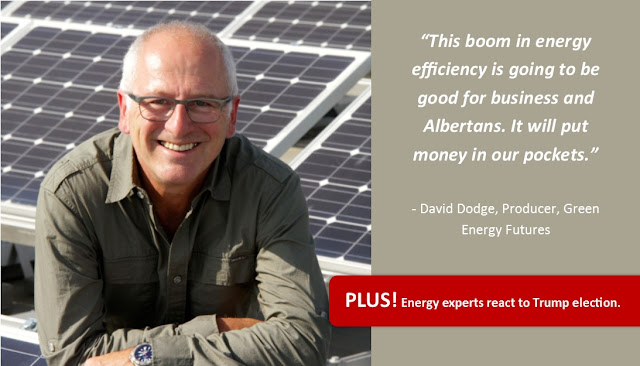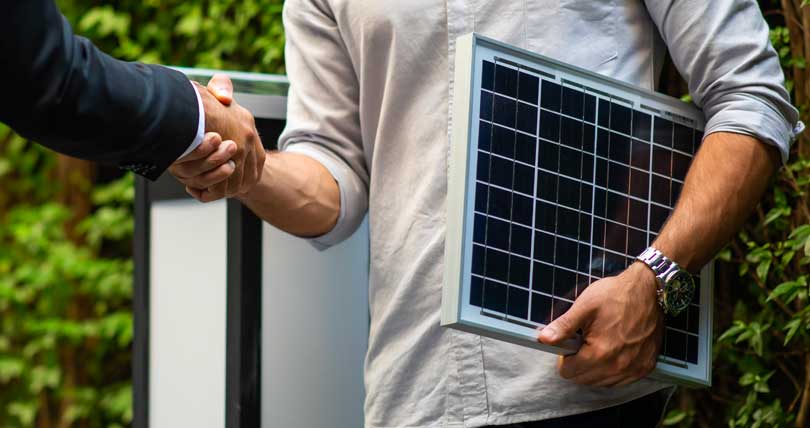By: Deanna McArthur
It has been a jam-packed month for energy and climate leadership news. From the launch of Energy Efficiency Alberta, to the provincial government’s announcement of the Renewable Electricity Program, and to the unexpected election of Donald Trump as the next President of the United States, it can be hard to keep up.
We have gathered comments from some key players in renewable energy and summarized some of the more popular stories that have circulated in the last 30 days to hopefully bring our readers up to speed.
Energy Efficiency Alberta is launched
Created by the NDP as part of its Climate Leadership Plan, Energy Efficiency Alberta is a new agency tasked with promoting and supporting the importance of energy efficiency, creating community energy solutions, and promoting micro-generation opportunities for Albertans.
David Dodge of Green Energy Futures was named Chair, Board of Directors of this new agency. An opportunity he says he takes very seriously.
“I spent the last five years traveling across Canada talking to leading politicians, entrepreneurs, and individuals who are working on green energy and energy efficiency projects,” said Dodge. “I was not expecting my work to lead to this but, during my time, I saw a wealth of potential, in a field that is rife with innovation and change. This is a great opportunity for all of us.”
The first three energy efficiency programs to be rolled out in the New Year include:
- Direct Install Residential Program: Albertans will have low-cost energy efficiency products such as lighting, water fixtures and heating components installed for free in their home.
- Residential Consumer Products Program: Offers rebates to residential customers at retail outlets on energy efficient lighting, insulation, and appliance.
- Business, Non-Profit, and Institutional Rebate Program: Offers incentives for high-efficiency products and installation of electric and gas-based products such as lighting, heating and cooling systems and hot water system.
And we are sure to see a boom in energy efficiency programs and products in the near future, says Dodge.
“Any company gearing up to be involved in energy efficiency is doing exactly the right thing at this time. Alberta hasn’t done energy efficiency programs for quite some time. If there is one thing I have learned, it’s that Albertans understand energy efficiency and renewable energy; we hope to help them make really good choices.”
“If we can help them navigate the sea of potential ways of becoming more efficient, then that, in turn, will help private companies offer products and programs because they are dealing with a consumer base that is educated.”
Alberta Government Announces Renewable Electricity Program

Unveiled at the Canadian Wind Energy Association (CanWEA) annual conference and exhibition in Calgary, this renewable energy program will be administered by the Alberta Electric System Operator (AESO) and is expected to add 5,000 megawatts of renewable electricity capacity to the provinces grid by 2030.
“The program is a good start. It invites bids to provide 400 megawatts of renewable energy,” said Dodge. “It appears the program is designed to get us clean energy at a good price.”
Alberta Environment Minister Shannon Phillips said the program is a key part of the province’s Climate Leadership Plan to meet its target of having 30 percent of Alberta’s electricity come from renewables.
But how will this be different than what has happened in other provinces across the nation? We have heard the horror stories from Ontario. Our social media platforms also reveal the skepticism and worry that this new program will mean skyrocketing energy prices.
If calculated decisions based on past experiences are made, Alberta can avoid this kind of negative outcome, says Dodge.
“We have the benefit of hindsight. We are able to look at other places across the country and learn from what they have done. We have the advantage of learning from renewable energy policies that worked and avoiding those that have not.”
And, according to the province, safeguards will be in place to ensure that the process is fair and transparent, which will help limit costs to consumers.
Alberta Group Demands Plebiscite on Carbon Tax
The same group that organized rallies against the provincial carbon tax in October is hoping to get at least 500,000 signatures on its petition demanding a plebiscite on the carbon tax issue.
The carbon levy that will be introduced January 1, 2017 will be applied to all fuels that emit greenhouse gases when combusted, at a rate of $20/tonne. In 2018 the levy will increase to $30/tonne.
The provincial government says carbon rebates will offset costs associated with the levy to help low and middle income households adjust. To help businesses, the small business tax rate is being cut by a third.
The group that calls the carbon tax “an economy killer” hopes to submit the petition to the legislature within the next couple of months.
Donald Trump Elected President
Yes, it happened. Donald Trump is going to be the next President of the United States.
This was possibly the most anticipated election of our time. I know many fellow Canadians sat on the edges of their seat, as I did on Tuesday night, waiting and wondering how the decisions of our neighbour and largest trade partner would affect us for the years to come.
I am not going to get into how I feel about the outcome of the election, but rather dive into what experts are saying his victory could mean for the energy industry and for the fight against climate change.
As Reid Southwick of the Calgary Herald put perfectly, Trump’s election presents a double-edged sword to Alberta. “Industry backers crave U.S. approval of a major pipeline, while they fear conflicting carbon policies will pose a big disadvantage in Canada.”
Ed Whittingham, Executive Director of the Pembina Institute said in his first reactions to the election results, “The election was not about climate change – in fact, it was rarely discussed as a policy issue on the campaign trail. But Trump did threaten to ‘cancel’ the Paris climate agreement, and his presidency is a threat to the post-Paris momentum that the world has worked so hard to maintain.”
With the Paris Agreement becoming international law earlier this month, we are all wondering if he will stick to his guns and back out of the Agreement as he said he would.
“Post election we have seen a lot of backpedaling on some of the high-profile issues,” said Greg Dotson, Vice President for Energy Policy at the Center for American Progress during a webinar hosted by the Pembina Institute. “There have been mentions in the media that the Paris agreement will be spared, but we don’t know that definitively yet.”
“Ultimately a transition to a clean energy economy is unstoppable, no matter what the administration does.”
So, in light of the recent events, what should Canada do?
“Stay the course and follow through on our promises,” said Kathryn Harrison, Professor of Political Science at the University of British Columbia during the Pembina webinar. “We have a long history of not following through, particularly when there is a risk of divergence from the U.S.”
And it seems like that is exactly what the Federal Government is planning to do. Prime Minster Justin Trudeau announced that it was full steam ahead for the government’s environmental plan – including a national carbon price – despite a Trump presidency.
All predictions aside, we will just have to wait and see. Only time will tell how these current events will truly affect our country and our province.
What is in store for Green Energy in Alberta?
Alberta is going to develop some sophisticated energy efficiency programs, says Dodge. And Albertans are interested and vested in the future of green energy in the province.
“From what I have seen in my travels I would argue that Albertans have a higher than average interest in renewables. We are extremely well positioned. Our entrepreneurs and businesses have been struggling away with no support, building net zero homes and all kinds of really interesting things. They have made headway before anyone really started taking this topic seriously.”
The focus on renewables is going to be positive for our province according to Dodge.
“When we talk about renewable energy we aren’t talking about competition with conventional industries, we are talking about diversification. This boom in energy efficiency is going to be good for business and Albertans. It will put money in our pockets. This will be good for all of us.”
“Everything that is happening now is going to make Alberta more competitive. Think about it: 5 gigawatts by 2030… that’s a lot of work and a lot of electricity. If you look at the big picture and consider what we have already pledged to do and add that to what Saskatchewan is hoping to accomplish (50 percent of energy from renewables by 2030) then we are talking about the growth of a new industry in Western Canada. That is true diversification.”
“I hope to see a lot of other technologies be developed in the future, with a wealth of different benefits.”
Well said, David… so do we.




